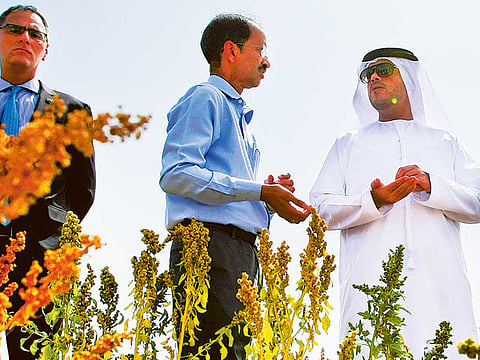Local farmers urged to grow ‘superfood’ quinoa
Quinoa has proven to be highly nutritious, resilient in arid conditions of the UAE, and requires little resources

Dubai: The Ministry of Environment and Water is wooing the private sector and farmers to grow the South American crop quinoa — dubbed a ‘superfood’ and ‘crop of the future’ — to help enhance the country’s food security.
A promising harvest of locally grown quinoa awaits its proponents at the Agriculture Innovation Centre in Al Dhaid this week. The ministry began growing quinoa in the UAE in December 2013 and yielded 4.5 tonnes of quinoa in April last year.
Quinoa, ‘the miracle grain of the Andes’, is a type of seed that transcends grains in nutritional value. It contains more protein than rice and wheat, with nutrients that include essential amino acids, fibre, minerals, vitamins, and essential fatty acids such as linoleic acid and Omega 3.
“This crop will partly assist in our efforts to ensure food security in the UAE. This has very high nutrition, can easily be grown and doesn’t require much resources,” Mohammad Mousa Abdullah, Director of Agricultural Research at the ministry, told Gulf News.
“With the cooperation of the farmers, they will recognise the quality of this crop, its benefits for human and animal consumption.”
Growing quinoa in the UAE is part of one of the thrusts of the ministry — sustainable farming. Besides quinoa’s nutritive contents, its higher adaptability to harsh climates in arid regions such as the UAE, as compared to other seeds and grains, is also remarkable.
Quinoa thrives in different altitudes — even as high as 4,500 metres above sea level. It withstands wide ranges of daily temperatures from -0 degrees Celsius up to 30C. Its salt tolerance makes it suitable for growing in the UAE, given the country’s highly saline water.
“We believe that quinoa is one of the crops of the future,” Dr Ismahane Elouafi, Director-General of the International Centre for Biosaline Agriculture (Icba), told Gulf News. “It could play a huge role in food security worldwide and the reason behind it is that the population is growing.” The centre has been growing and studying quinoa in the UAE since 2006.
“Global population explosion means more mouths to feed. Arable land that can be used to grow crops for food has been exhausted, leaving us no choice but to use non-arable or marginal land like that in the UAE.
“So the only way to produce more food for the world is to produce on non-arable land. So when you go to marginal land, you have to look at new crops and quinoa is one of them,” Dr Ismahane said.
Growing quinoa locally is also economically viable compared to other seeds or grains, according to Icba’s research.
“With quinoa, you could get about 10 times more return on investment compared with corn, barley, rice, and wheat,” Dr Ismahane said.
Sign up for the Daily Briefing
Get the latest news and updates straight to your inbox


